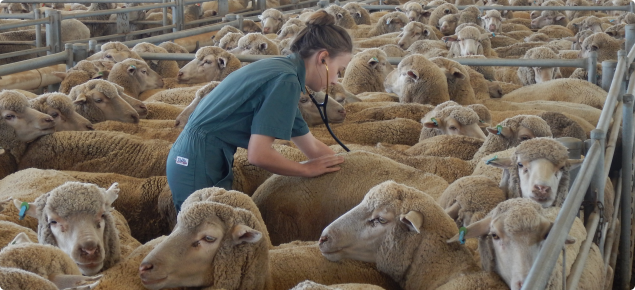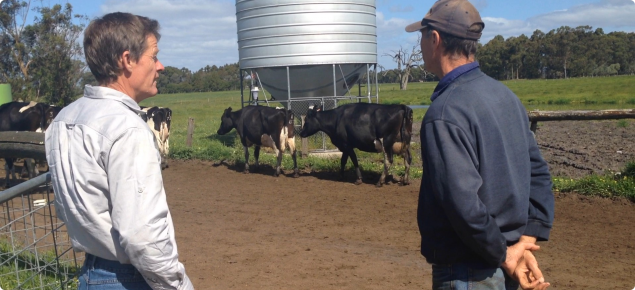Benefits of calling a vet
The individual, regional and industry benefits of calling a vet when a livestock health issue occurs include:
- finding out what the disease is so it can be treated correctly and future disease can be prevented or minimised
- protecting the future of your business and your industry, as laboratory results from livestock disease testing are used to prove that Australia is free of specific diseases that could harm public health or damage our markets
- protecting your neighbours – if the disease is a damaging one, calling a vet early and obtaining a diagnosis means that you can help to prevent the disease spreading to your neighbours and to other producers in the region.
Overcoming the barriers to calling a vet
Producers may sometimes be deterred from immediately calling a vet because of the potential cost and/or the distance of the property from a vet.
The Department of Primary Industries and Regional Development (DPIRD) recognises the difficulty that cost and distance pose to producers in these cases.
To protect WA’s biosecurity, DPIRD has a range of subsidies available to support producers to call a vet to investigate:
- unusual disease signs in livestock
- abnormal behaviour
- unexpected or multiple deaths or
- if they suspect a reportable disease.
These subsidies help to support WA’s markets and consumer confidence. Investigating animal disease where animals show suspicious signs allows WA to demonstrate to markets that we are free of significant diseases.
Surveillance programs for WA livestock producers
The livestock surveillance incentive programs available to WA producers are summarised below. The associated forms for vets and producers are available on the Animal health surveillance and disease control forms webpage.
1. Significant Disease Investigation (SDI) Program
Under the SDI Program, DPIRD provides a subsidy to private vets for an initial investigation of significant disease incidents. This means private vets can carry out disease investigations at reduced cost to the producer.
For cases to be eligible for the SDI Program, they must:
- involve cattle, sheep, goats or pigs from a commercial herd/flock (at least 50 sheep or goats, or at least 20 pigs; or at least 10 cattle, but there is flexibility in cases of potentially reportable diseases)
- involve a horse or horses showing neurological signs
- have multiple animals affected (but this is flexible in cases of potentially reportable diseases)
- be from a commercial herd/flock (at least 50 sheep or goats; or at least 20 pigs; or at least 10 cattle, but there is flexibility in cases of potentially reportable diseases)
- include the following characteristics:
- an unusual disease incident
- visible signs consistent with a reportable disease without a clear alternative diagnosis or
- potential effect on trade, public health or the viability of a farm, industry or region.
When a case consistent with the SDI criteria occurs, the private vet must contact their local DPIRD vet to seek approval to include the case in the SDI Program and discuss samples to submit for the investigation.
Note: DPIRD can only pay for significant disease investigations when a DPIRD vet authorised the investigation.
For more information, talk to your DPIRD vet or private vet, or see the significant disease investigation webpage.
2. National Transmissible Spongiform Encephalopathies Surveillance Program (NTSESP)
Bovine spongiform encephalopathy (BSE or mad cow disease) in cattle and scrapie in sheep do not occur in Australia. These diseases are progressive and fatal neurological diseases of animals. Animals with these diseases do not respond to treatment and all affected animals die.
To continue to show we are free of BSE and scrapie and to maintain access to international markets, Australia has a surveillance program to detect cases if they occur.
The National TSE Surveillance Program (NTSESP) has rebates available for producers and vets for cases where animals show neurological signs such as changes in behaviour, gait abnormalities such as 'the staggers', constant trembling, increased sensitivity to sound and touch, and persistent itchiness in sheep.
Producers who see cattle or sheep with neurological signs or sheep with persistent itchiness (where lice infestation has already been excluded) should contact their private vet or DPIRD vet to discuss the inclusion of the animal in the TSE surveillance program.
Cattle must be 30 months or older but less than nine years. Sheep must be over 18 months or older, but preferably less than five years old.
Producers who have suitable animals autopsied for the program can claim $330 for cattle and $110 for sheep (GST inclusive). Producers may claim this payment for up to two animals per disease outbreak per property. Vets are also eligible for rebates to offset the cost of the post-mortem and travel. NTSESP also covers laboratory fees and subsidises freighting samples to the laboratory.
For more information, talk to your DPIRD vet or private vet, or visit the NTSESP webpage.
3. National Arbovirus Monitoring Program (NAMP)
Both southern and northern WA producers benefit from the National Arbovirus Monitoring Program (NAMP). NAMP monitors the distribution of economically important insect-borne viruses of livestock and their vectors, specifically bluetongue virus, Akabane and bovine ephemeral fever. NAMP is designed to detect any new strains of bluetongue virus and changes in distribution of these viruses within Australia. Producers who are in the bluetongue free zone can access valuable markets as some countries require ongoing assurance that live sheep, goats and cattle imported from Australia are free of such viruses.
NAMP carries out its monitoring via:
- sampling and testing for antibodies in sentinel cattle
- trapping insects to check for the presence of insect vectors.
Vector traps and sentinel cattle are located at nationally determined strategic locations to enable a bluetongue free zone to be defined for export trade. Producer subsidies are provided to set and collect the insect traps and for mustering for sampling and testing of sentinel cattle.
For more information, talk to your DPIRD vet or private vet, or visit the NAMP webpage.
4. Avian influenza and Newcastle disease surveillance
Avian influenza is an infectious disease of birds. Some strains have the potential to affect people and some can cause significant losses in poultry. Poultry owners must maintain good biosecurity to prevent the disease entering their flocks and report signs of disease immediately.
WA commercial poultry owners must comply with surveillance, reporting and biosecurity requirements in order to reduce the risk of Newcastle disease being introduced to their flocks and to ensure the disease is quickly eradicated if it occurs. Long-life chickens (layers and breeders) in flocks of more than 1000 birds must also be vaccinated against Newcastle disease.
Disease investigations in poultry displaying signs similar to avian influenza or Newcastle disease will be subsidised.
For information about avian influenza or Newcastle disease, contact your vet or see the avian influenza and Newcastle disease webpages.
5. Ewe abortion and newborn lamb deaths surveillance
Sheep producers with flocks experiencing abortions and newborn lamb losses are eligible for free testing by DPIRD to determine the cause. Common infectious causes are tested for as well as reportable diseases. The results contribute to proving that WA is free of reportable diseases such as enzootic abortion that could damage trade or public health.
Under the program, producers collect a free esky and instructions from DPIRD or their private vet and collect samples from at least three ewe abortions or newborn lamb deaths and then submit them to the DPIRD laboratory.
This program makes it easier for producers with low numbers of abortions and lamb deaths to obtain a diagnosis. If the abortions or lamb deaths continue, or if adult sheep are unwell, producers should call a vet for a full investigation. This may still qualify for a subsidy under the SDI Program.
For more information or to collect a kit, contact your local DPIRD field vet or private vet, or see the ewe abortion surveillance webpage.
6. Bovine anaemia due to Theileria orientalis group (BATOG)
There are many causes of anaemia, jaundice and abortion in cattle, including bovine anaemia due to Theileria orientalis group (BATOG). The DPIRD BATOG surveillance program assists WA cattle producers and vets in the Lower Great Southern to obtain a correct diagnosis by providing subsidised testing for producers and sampling kits for vets.
For more information, contact your DPIRD vet or private vet, or see the BATOG surveillance webpage.



